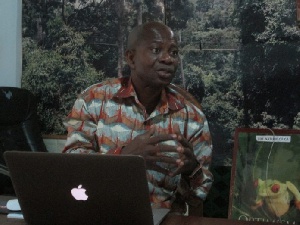Conservation Alliance International and its partners will, on Thursday, outdoor the Boame Cocoa Scheme, an initiative that aimed at supporting cocoa farmers to enhance the management of their farms.
Boame, an Akan name meaning “help me,” would improve farm productivity, the ecological health of cocoa farms and household incomes.
Already, a pilot of the scheme was implemented in 2015 in over 50 farming communities in the Central and Western regions and had proven very positive.
Dr Yaw Osei-Owusu, the Executive Director of Conservation Alliance International, said this in an interview with the Ghana News Agency in Accra on Wednesday, ahead of the outdooring of the event.
He said the main challenge confronting the sector was poor management of over 30 per cent of 1.9 million hectares of the cocoa production landscape.
This, he said, was largely due to inadequate farm labour, the high cost of inputs and ageing farmers, multiple enterprises of women cocoa farmers and inherited farms.
He explained that the Boame Cocoa Scheme would help address the challenges of inefficient management of cocoa farms, high cost of inputs, multiple enterprises of women famers in order to realise the farms’ full potentials for adequate returns.
Dr Osei-Owusu said the initiative would complement the government’s effort of improving cocoa production through the Cocoa Rehabilitation and Intensification Programme (CORIP), funded by the Embassy of Netherlands and the private sector.
He said the novelty, being jointly implemented by Cerath Investments, Biodiversity Heritage Associates, and Vital Info Consult was targeting more than 60,000 cocoa farmers across the country to deliver market-oriented services to farmers.
“The work in Ghana is part of a larger two-country programme, targeting 400,000 cocoa-growing households across Ghana. The programme will be active in 15 districts in the Eastern, Western and Central regions. We hope to extend the initiative to cover all the cocoa growing regions by 2020,” he said.
Mr Ato Kwamena Addo, the Boame Scheme Coordinator, said per the scheme, Cerath Investment would support farmers with interest-free loans to purchase inputs and labour, and pay after the harvest and sale of their cocoa.
He said the Scheme would provide an opportunity to support Government’s efforts at improving cocoa production and farmers’ wellbeing and appealed to
donors and cocoa companies to support the scheme.
Mr Addo said during the pilot phase farmers who signed unto the scheme had their farms assessed to establish the management gaps, after which management prescriptions were determined and implemented in line with the Cocoa Research Institute of Ghana and COCOBOB’s guidelines.
He said the Scheme had recruited, trained and equipped more than 30 youth into the Boame Scout to implement those management practices under the direct supervision of Conservation Alliance International.
He said farmers who signed onto the Scheme during the pilot phase recorded significant improvements in outputs and revenue adding that most of the farmers realised over 70 per cent increase in farm.
Mr Addo also highlighted the employment opportunities for the youth who participated in the Scheme, which intends to increase the number of scout members to 200 within the next two years.
Since 2008, Conservation Alliance International has been a leader in promoting sustainable approaches to biodiversity conservation and socio-economic development in cocoa-producing regions in Ghana.
With nearly 50 initiatives in Ghana, Cote d’Ivoire, Liberia, Sierra Leone, Cameroun and Nigeria, the Alliance actively supports a range of farm-level programmes, harnessing sustainable agriculture practices to improve the quality of life for the millions of smallholder farmers in growing the unique crop.
Business News of Wednesday, 5 September 2018
Source: ghananewsagency.org













